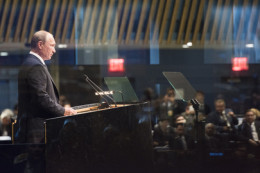
The U.S. government doesn’t want to admit that its heady “unipolar” days are over with Russia no longer the doormat of the 1990s, but Washington’s arrogance risks war, even nuclear annihilation, explains Gilbert Doctorow.

Donald Trump’s “big” foreign policy speech was a mishmash of his reasonable calls for American restraint blended with some bluster about unleashing military force, salted with some predictable Obama bashing, writes ex-CIA analyst Paul R. Pillar.
Exclusive: Perhaps nowhere does U.S. hypocrisy over human rights stand out more clearly than Indonesia’s “Year of Living Dangerously” slaughter of vast numbers of people in 1965, dirty secrets that Jonathan Marshall says finally deserve airing.
Egypt’s military regime is suppressing political opposition even more ferociously than the longtime Mubarak dictatorship while also collaborating in the strangulation of Gaza, writes ex-CIA analyst Paul R. Pillar.
Exclusive: Support for the “war on drugs” has eroded so much that anti-drug-war hoax statements from senior officials sounded plausible even to the mainstream media, writes Jonathan Marshall.
The biggest political story of 2016 has been the rise of protest candidates Donald Trump and Bernie Sanders, but it was a phenomenon that the mainstream U.S. media largely missed or belittled, writes Neal Gabler.
When Russian air strikes kill civilians in Syria, it is big news in U.S. newspapers, but there is near-total silence when U.S. bombs kill civilians in Iraq or Syria, a human rights dilemma addressed by Nicolas J S Davies.
By pouring weapons and money into the Syrian war, the West and its Gulf state allies share in the guilt for the Islamic State’s partial destruction of Palmyra’s historic ruins, which Jeff Klein visited.
As the Democratic Party grimly marches toward Hillary Clinton’s nomination, little thought has been given to her extraordinary record as a war hawk and what that could mean to the world, observes ex-CIA analyst Paul R. Pillar.
Special Report: With the Warren Report on JFK’s assassination under attack in the mid-1960s, there was a chance to correct the errors and reassess the findings, but CBS News intervened to silence the critics, reports James DiEugenio.